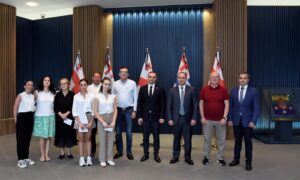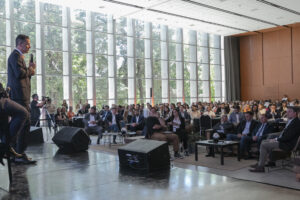Open Parliaments: The Case of the Córdoba Province, Argentina
In this blog series, we highlight the experiences of several open parliaments around the world. These are institutions that foster transparencyAccording to OGP’s Articles of Governance, transparency occurs when “government-held information (including on activities and decisions) is open, comprehensive, timely, freely available to the pub... More, participation, and accountability throughout the legislative process.
The Legislature of the Córdoba Province in Argentina is a unicameral legislative body made up of 70 legislators representing almost 4 million citizens.
In 2019, the province of Córdoba launched an “Open Legislature” strategy to strengthen the role of the parliament and re-engage with citizens. This strategy set in motion a plan around three pillars: innovation, transparency, and citizen engagement. Under each pillar, the Legislature of Córdoba implemented specific actions with measurable milestones by: (1) adopting new technologies for a more efficient administration, (2) opening up information for thorough accountability, and (3) strengthening ties with the community and other institutions.
This led to modernizing its technological infrastructure to increase data manageability and accessibility. This involved the development of a new digital system for parliamentary work, that also allows citizens to monitor and access information about sessions and resolutions. It also implied creating an Open Data Portal that offers public data in an accessible and reusable format.
One of the fundamental tools we used for a more open parliament was the Latin-American Legislative Transparency Index (ITLT), which analyzes relevant information on the legislative powers and monitors the tasks they perform from the perspective of transparency and access to public information.
The Legislature of Córdoba was the first sub-national parliament to be assessed against ITLT. The result provided an unbiased notion of the level of transparency and helped design the strategic guidelines for coming policies.
Fundamentally, the continuity of public policies through time and under different administrations is a requirement for a healthy and resilient democracy. In 2022, the Legislature began formalizing its institutional commitment to a strategic plan for open parliament. We adopted the OGP approach to co-create our first Open Parliament Action Plan with universities, civil organizations, and citizens. The plan was later formalized in an administrative resolution. Considering the challenge of policy continuity, the first commitmentOGP commitments are promises for reform co-created by governments and civil society and submitted as part of an action plan. Commitments typically include a description of the problem, concrete action... proposed by the Legislature was to formalize the policy of open parliamentEnsuring access to legislative information and creating mechanisms for public participation are critical to building an open, trusting relationship with citizens. Technical specifications: Commitments... More into the Legislature’s bylaws. The other commitments aim to develop internal competencies and abilities in open parliament and encourage civic participation and public awareness of the Legislature’s work.
Among the most important achievements of this process is the amendment of the Legislature’s bylaws, including a specific title regarding Open Parliament, and transforming the strategy set out in 2019 into state policy of the Legislative Branch. In November 2022, the plan was ratified and the bylaws amended. The amendment not only specifies the principles, mechanisms, and specific information to make available to the public, but also formalizes the units that offer technical assistance and analysis of the government’s budget on one hand, and that respond to public inquiries on parliamentary information of any kind on the other.
The Legislature and its administration continues to work on the objectives of the action planAction plans are at the core of a government’s participation in OGP. They are the product of a co-creation process in which government and civil society jointly develop commitments to open governmen... and expects to produce an assessment of results by December 2023.
No comments yet
Related Content
 Challenges and Solutions
Challenges and Solutions
Open Parliaments: The Case of the State of Guanajuato, Mexico
Guanajuato is one of the 32 states in Mexico and its State Congress is made up of 36 local congresspeople who represent over 6 million citizens.
 Challenges and Solutions
Challenges and Solutions
Open Parliaments: The Case of the Autonomous Republic of Adjara, Georgia
The Autonomous Republic of Ajara is a political-administrative region of Georgia. Its Supreme Council is made up of 21 congresspeople who represent about 350,000 citizens. While the Autonomous Republic of…


Leave a Reply